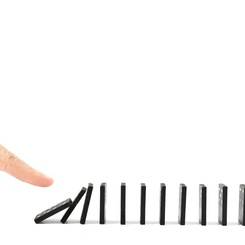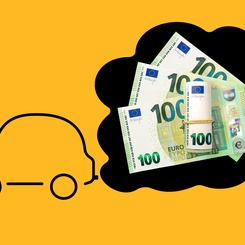EK: What is the difference between economics and experimental economics?
Radu Vranceanu: Dating back to more than 250 years ago, economics is a social science analyzing the allocation of scarce resources among multiple users. In decentralized economies, the economic analysis focuses on market allocation and provides us with a meaningful theory of prices. At the heart of the theory, economics places the individual who must make choices, given his/her goals, resource constraints, and available information. While economists clearly understood and stated that human goals can be quite diverse, many analyses considered that people are essentially self-regarding and even selfish. Interestingly, even under this set of restrictive assumptions, it can be shown that voluntary trades specific to the free market economy allow to deliver the highest welfare.
The methodology of traditional economics involves the thorough knowledge of economic facts, the development of theories based on axiomatic human choices, and empirical testing of these theories, by confronting the predictions of the theories with a large set of observations collected from the field. The latter led to the emergence of econometrics, a discipline focusing on statistical inference from large sets of economic data.
Experimental economics is a relatively recent subfield of economics; if the first studies were developed in the 1960s, the field got momentum in the 1990s. Today, there are several specialized journals, a large international scholar association (the Economic Science Association) and many national associations. Three economists -- Vernon L. Smith, Daniel Kahneman, Richard Thaler -- were awarded the Nobel Prize for their contribution to this field.
By taking seriously the concept of “sophisticated” decision-makers, experimental economics helped traditional economics to address new issues, and sometimes went so far as to qualify in a critical way the postulates of the field, mainly as pertaining to the “economic model of man”.
EK: How does it work?
Radu Vranceanu: The basic methodology is inspired by laboratory experiments as frequently implemented in psychology. We invite subjects to the lab where, under anonymity, they are invited to make economic decisions, either alone or in interaction with other participants. These decisions involve costs and benefits for the subject in the lab. Ideally, subjects are allocated to two groups at random, one group is submitted to the stimulus, the other group receives a “placebo” or no stimulus. The difference-in-differences in the output variable allows detecting the “neat” effect of the stimulus.
To add a touch of realism, and also to make sure that subjects take the experiment seriously, subjects are paid in cash depending on their performance in the lab.
To take a simple example, let us assume that when you arrive at the lab you receive 20 euros. You are asked to share it with another anonymous player present in the room. How much would you give? Many economists would answer “nothing, why should I share this money with an unknown person who does not know who I am?”. In reality, people care about the other. They have “social preferences”. In the lab, such “Dictators” will give on average about 20% of their endowment to their unknown partner, with significant heterogeneity across individuals (some give nothing). This result is quite robust to changes in stakes and cultures.
In the Ultimatum Game, the receiver can refuse the offer, and in this case, the payoffs of the two players are set to zero. This creates a genuine strategic interaction between the two participants. With selfish self-regarding agents, the receiver should accept a very small positive amount, let say 1 euro, since 1 is better than zero; therefore a “rational” proposer should offer 1 euro, no more. Hundreds of lab experiments showed that receivers systematically refuse offers below 30% of proposers’ total endowment. Proposers, realizing this concern for fairness, make, on average, offers of approximately 40% of their endowment.
EK: Why theory and traditional data analysis are not enough? Do lab data create added value?
Radu Vranceanu: The development of experimental economics prompted economists to consider a broader definition of the economic model of man. Inspired by results from relatively simple experimental games, as shown above, they moved beyond the selfish self-regarding agent to decision-makers who care about the others, follow social norms, reciprocate, have a feeling of justice, and so on. At the borders of the discipline, we can now find more and more studies trying to put together both cold-hearted decision dear to traditional economists and human emotions. Frontiers with psychology and consumer behavior are becoming more and more diffuse.
In my opinion, these new contributions do not challenge in a significant way the main findings of traditional economics such as the law of demand, pricing under competition, monopoly pricing, international economics, etc., but help to expand the frontiers of the field.
From a methodological point of view, the interesting thing with experiments is that they provide neat tests of causality. In the controlled environment of the lab and in field experiments, one can be almost sure that the effect is due to the treatment and not to some omitted variable.
EK: Are there any limitations? How are we to take them into account?
Radu Vranceanu: Obviously, there are limitations. One cannot trust an experimental result if the experiment has not been replicated many times. Many “established” results are very sensitive to framing, and will not hold in a different context. For instance, it is an established fact, that, in the lab men prefer riskier lotteries than women. However, other studies have revealed that in investment choices among female and male traders, there is no difference in risk-taking. The experimenter demand effect, where subjects try to “please” the experimenter and second-guess the “right” behavior, can also be a problem.
In general, experiments have weaker external validity compared to traditional empirical research based on large data. Yet, I must emphasize that the purpose of experiments is not to replace traditional econometrics, but to call attention to important features of human decision-making that were at some point neglected by “old economics”.
EK: Can you tell me more about the type of experiments you conduct here, at ESSEC? A recent example maybe? What were your findings?
Radu Vranceanu: The ESSEC Experimental Lab was established in March 2010 and since its creation, it has allowed to implement many behavioral studies in marketing, management, finance, operation research and economics. Collaborating with other colleagues economists - I ran approximately twenty experiments, with 2200 participants. Several studies analyzed cheap talk, lying and deception in economic choices. Some other research studied gender differences in competitiveness and cooperation at work. Two recent analyses consider donations for charities. I also studied coordination games in investment and bank runs. Most of these papers were published in academic journals among which the Journal of Economic Behavior and Organization, the Journal of Behavioral and Experimental Economics, the Journal of Economic Psychology, the other constitute work in progress.
As a recent example, recently published in the Journal of Behavioral and Experimental Economics (January 2019), Delphine Dubart and I analyze individual lying behavior in a classic Deception game as introduced by Uri Gneezy in 2005. We develop a new task to investigate whether people can be “bought into dishonesty”, and issue false messages, detrimental to another player, to their own benefit. Many subjects in the role of the Sender respond to incentives in line with price theory: they will forgo honest communication only if the benefit from lying is large enough; some are “ethical” – will never lie regardless of the forgone benefit, and some are “spiteful”, i.e. lie even if the benefit for them is zero.
In a classical paper, in 2007, Muriel Niederle and Lise Vesterlund showed that, when given the opportunity, more women would avoid executing a real effort task under tournament-based compensation than men. In a paper published in the Journal of Economic Psychology, co-authored with Seeun Jung, professor at Inha University, South Korea, we analyzed changes in the behavior of subjects exposed to competitive pay schemes (tournaments), in two different cultures – in Korea – an interdependent culture, and France, an independent culture. We measured well-being before and after allowing subjects to perform in a winner-take-all real effort task. We corroborate existing results – in France - and we find that women dislike being exposed to competition in the workplace. However, in Korea, women enjoy competition; furthermore, their productivity response is comparable to that of French males. Such research has managerial implications, multinational firms should implement different compensation schemes depending on the country they are based in. It also points out the risk of “quick” generalizations to other cultures of results based on Western subjects only.
EK: Why was it important for ESSEC to have its own lab?
Radu Vranceanu: At ESSEC we are strong proponents of innovation and entrepreneurial spirit in all academic domains. The creation of an experimental lab by a transdisciplinary team of dedicated professors, with the support of the School’s management, is one example of academic innovation. I feel that experimental research is a must for a business school like ours that has a stated mission of delivering original and impactful research with applications for businesses.
For more information, see: https://behavioralresearchlab.essec.edu/









